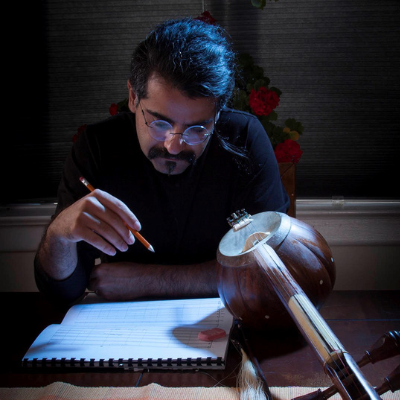Showan Tavakol
Ph.D in music student (composition and sound creation)

- In a few words, how would you describe yourself?
I’m a creative, productive musician with solid instrumental technique. As a composer I try to create bridges that mediate between world music and contemporary music. Flexibility and adaptability are two principals that are always at work in my compositional process.
- Talk to us about your background
I’m an Iranian musician and composer of Kurdish origin born in Tehran. I immigrated to Québec in 2015 with autonomous-worker status. At the present time I’m a Canadian citizen. I started music at the age of nine, attracted by the violin. I studied classical violin to begin with, but after a short time I realized that I found the traditional forms of Iranian music, especially in their ceremonial formats, infinitely attractive. That’s the reason I started learning the kamancheh (an Iranian fiddle whose timbre seemed truly magical to me).
During my university studies I earned a degree in music and a master’s in kamancheh performance from the Faculty of Fine Arts at the University of Tehran. Although my bachelor’s work was more focused on performance, it ended with the analysis and interpretation of one of my compositions for a quartet of bowed string Iranian instruments. Similarly, my master’s project came to fruition in the form of concerto for kamancheh and symphony orchestra. When I arrived in Montréal, I continued my composition studies in a master’s program at the Université de Montréal Faculty of Music, and right now I’m enrolled in my third year of a doctorate in composition and sound creation.
I think the challenge of finding a balance between traditional Eastern performance (based on improvisation) and Western orchestral music led me naturally towards the profession of composer. That’s possibly the reason why, currently, I’d like to integrate elements of world music, particularly those of Middle Eastern modal music and Persian classical music, in my contemporary compositions. Finding meeting points between those two worlds is what led me towards creation.
As a kamancheh specialist, it’s interesting to note that, when I begin a musical composition, modal structures generate my manner of expression in an unconscious and natural way. When I try to write in a contemporary Western musical language, I have to rise to the challenge – every time – of unifying two different worlds in order to get close to a type of contemporary modal music with a Middle Eastern flavor. In fact, as I see it, it’s that contradiction that’s helped me find my signature.
- Which study program(s) are you taking at the Faculty of Music?
In 2017 I earned a master’s in instrumental composition under the direction of François Hugues Leclair and Ana Sokolović. Right now I’m doing a Ph.D. in composition and sound creation under the direction of Ana Sokolović and the co-direction of Nathalie Fernando. These people are all very important in my professional development, and not just that, they’re influential on the music scene.
- What do you like best about the Faculty?
More than anything, what I like is the community. I also enjoy the professional ensembles affiliated with the Faculty, and a teaching staff that sees so effectively to students’ progress.
- Why choose composition and sound creation at the Faculty of Music?
In fact, it’s thanks to my teacher, Ana Sokolović, that I discovered the Faculty of Music and have been able to enjoy all its qualities, both in terms of teaching and the ambiance here, which is very friendly.
- For you, what is sound creation exactly?
It’s creation within present moments, in order to live the instants, the results or the performance. For me, all these moments represent an intuitive experience.
- What, in your view, gives the UdeM Faculty of Music its special “color”?
The welcoming atmosphere, close communication between teachers and students, the geographical location of the Faculty on the mountain, in terms of exercise.
- What are your sources of inspiration?
For creation I’m heavily and honestly inspired by other arts than music. I’m also inspired by the music of human beings as long as it comes from natural sources like a mother’s lullabies or traditional rural musicians.
- In what way is your stay at the Faculty of Music influencing your life?
Undertaking a master’s in composition at the Faculty of Music was a considerable challenge for me, particularly because it coincided with my immigration and the discovery of a new culture. Nevertheless, I felt supported, especially by my teachers. I think that helped speed up my integration in the network of musicians.
- What advice would you give to a first-year student?
My advice would be to be persistent, to be flexible, and that will enhance and facilitate your learning.
- What are the 3 most important qualities for a musician?
Perseverance, deep curiosity about the esthetic of other musical styles, and creativity: in my view these are essential qualities for an artist.
- Beyond music, what are your interests or your passions?
Apart from music, my family, meditation, nature and wildlife are my principal areas of interest.
- What are your plans for the future?
I’m hoping to write books about musical composition focusing on the relationship between composers and performers and involving multidimensional compositions. Besides that, I have a number of music projects for the performing arts.
April 2022